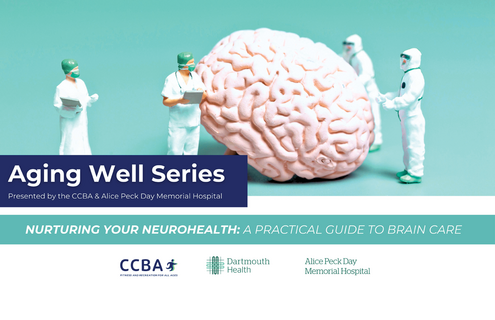
Aging Well: Boost Your Brainpower
The CCBA (Carter Community Building Association) and Alice Peck Day Memorial Hospital (APD) have partnered to offer Aging Well, a free series designed to help older adults take charge of their health. The program covers important topics like brain health, nutrition, Type 2 diabetes and insulin resistance, and mobility, supporting APD’s mission to improve community well-being.
Aging Well continued on April 24, 2025, with “Boost Your Brainpower,” a discussion of simple ways to take care of your brain as you get older. According to presenters Lisa Furmanski, MD (APD), Erika Sharbaugh, SW (APD), and Joanna Graber, RD, LD (CCBA), the changes you make each day can support a strong, healthy mind. The good news is that changes can be relatively easy, and it’s never too late to start.
Move Your Body, Fuel Your Brain
Being active is good for your brain. Try to get at least 150 minutes of moderate exercise each week. That could be walking, swimming, dancing, or anything else that increases your heart rate. Strength and stretching exercises are also helpful as part of a balanced routine.
If you are looking for support or inspiration, the CCBA offers group fitness classes, certified trainers, and an indoor pool. These resources can help you stay active and motivated in a friendly, community-based setting.
Eating well supports brain health, too. Tips include:
- 4 to 5 servings of fruits and vegetables daily
- 2 servings of lean protein daily
- 3 or more servings of whole grains daily
- Less than 1,500 mg of sodium per day
- Fewer than 36 ounces of sugary drinks per week
Great foods for your brain include berries, green leafy vegetables, fish, nuts, yogurt, and dark chocolate (look for 70 percent cocoa or more). You do not have to eat perfectly—just make better choices more often.
Sleep, Stress, and Staying Connected
Getting enough sleep helps your brain work better. Aim for 7 to 8 hours of sleep each night without waking up too often. If you still feel tired after that, it may be time to talk to your doctor.
Stress can affect memory, mood, and focus. Practicing mindfulness, like deep breathing or meditation, can help lower stress levels and bring a sense of calm.
The brain craves connection, and staying socially connected can help protect brain health. Spend time with friends, join a group, or do something with others that brings you joy and meaning.
Rethink Your Habits
Some habits, like smoking and consuming four or more alcoholic drinks per week, can increase the risk for memory problems or changes in mood. As you age, your body has a harder time processing alcohol, which can impact the brain. But making even small changes can go a long way.
Track Your Progress
One helpful tool introduced during the session was a Brain Health Scorecard, which can be used to reflect on your sleep, nutrition, blood pressure, and other daily habits. It’s a great way to see what is going well and where you might want to focus next.